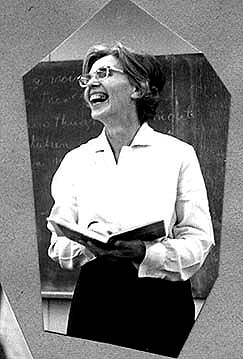Memories
of
Frau Lichter
by
Lief Carlsen,
'68

|
Memories of Frau Lichter by
|

|
Funny what a mind remembers after thirty-six years. A while back, somebody from Bitburg High School Alumni Association tracked me down on the telephone and sent me a list of my former classmates. I was surprised (disappointed?) to find that very few of the names evoked any memories at all. What did I expect? I was a solitary kid.In the days after the phone call, I found myself thinking back over my time at Bitburg. Most of what came to mind were mere fragments of memories: nameless girls admired from afar, taking the lead during cross-country practice, German words and phrases that I haven’t heard or spoken in years. The latter got me thinking about German class and Frau Lichter and it was as if the fog of thirty-six years cleared and she stood tall and gaunt at the front of her classroom once again.
I always thought she bore a startling resemblance to Old Maid - you know, of card fame. Sunken cheeks, gray hair, long teeth, legs that tapered not a centimeter from calf to ankle. I remember deciding early in the school year that I was not going to enjoy her class. The new trend in language instruction in those days was phrase repetition and pattern practice.
Our text was divided into thematic chapters introduced by about twenty phrases and followed by endless drills in which we would conjugate, dissect, and otherwise mangle the German language. Frau Lichter explained to us that language acquisition was largely a subliminal process whereby the brain assimilated phrases by sound and only by hearing and speaking them over and over again would we get “the feel” of German. I thought it all a bloody bore - until one afternoon she digressed briefly from her beloved pattern practice to talk about some German writer or poet and there was something in her voice that told me this woman really loves her language. Imagine that, I thought - loving a language.
Anyway, I think that was probably how I came to see her and her class in a different light. That’s not to say that I started regularly doing my homework or anything. I was much too preoccupied with the usual adolescent stuff to actually apply any significant part of my brain to the study of German. But I did find myself enjoying her class at times. Some of those phrases we memorized were catchy - almost like music in a way. I found I was learning to like the sound of German. I also stopped by her desk occasionally on my way out of class to ask her about some German word I’d seen on a sign or heard spoken on the streets of Bitburg. She seemed to appreciate my questions and I think a sort of bond developed between us. I must have asked her about the mythological German hero Siegfried because one day she showed me a lavishly illustrated book on the Siegfried legend and asked if I would like to read it. Astonished that she had taken the effort to bring a book just for me, I took it home and read it. I can still remember the illustration where Siegfried bathes himself in dragon blood making his skin “so hart wie Horn” (as hard as horn).
The next year, in German II, the pattern practice continued. On the whole, I remember the quality of teachers at BHS being high, but Frau Lichter was different. It was as if she were on a mission to impart as much of her beloved German to us as possible. A good example of this occurred on the day before Christmas vacation. This is a day when teachers traditionally take it easy on students and in many classes it’s little more than a day for movies and general goofing off. Not in Frau Lichter’s class. We were hard at work conjugating verbs when the turn passed to the boy in front of me. He cleverly inserted the English word “boring” into his sentence and the whole class, including me, burst into laughter. I think we were all a little resentful that our “goof off” day had been appropriated by actual learning and the boy’s comment, in addition to being clever, was also a way of getting even with Frau Lichter.
While we were yucking it up I looked at Frau Lichter. In that instant I could see in her eyes, in the way her shoulders slumped, in the way her textbook forlornly subsided from its usual proud position as she turned and walked to her desk that our moment of merriment and spite had hit its mark. I wanted to take all the laughter back. I wanted to apologize but I didn’t.
Later that year, my father was transferred to Ramstein AFB. The day we left, I stopped by her classroom to turn in my textbook. I managed to say something about appreciating how dedicated she was to her work. It came out rather awkwardly and I tried to start over. She stopped me with a gentle hand on my shoulder. A faint smile crossed her tightly closed lips and she nodded her head as if to say “I understand.”
I learned very little German at the new school. It was a real zoo. But for years afterward I would sometimes imagine that I had mastered her language and that I would send her a long, beautifully written letter in fluent German. In it, I would tell her that it was she who had built the foundation of my language skill. I would tell her that she had been right to stress the pattern practice.
Lief Carlsen, '68